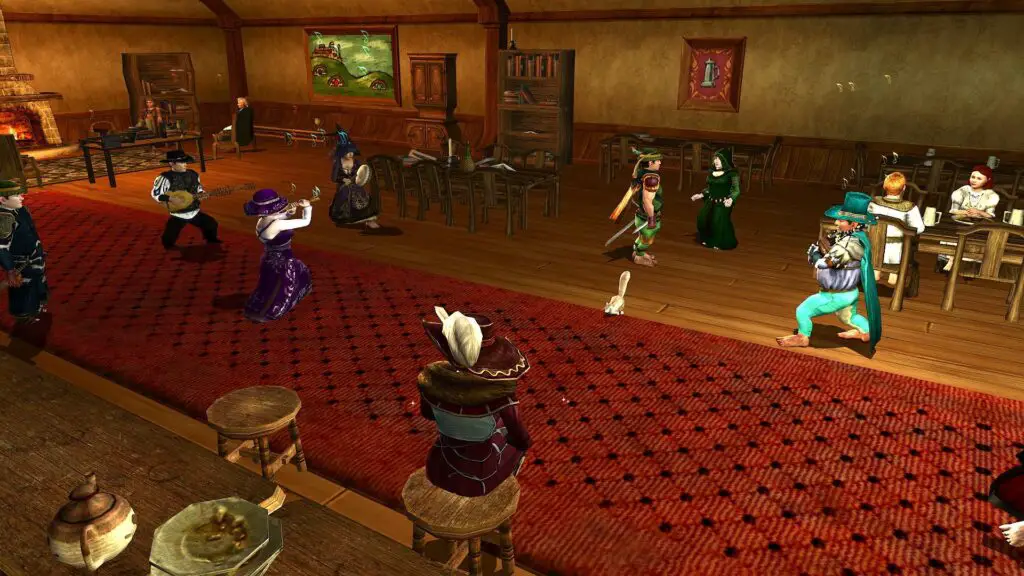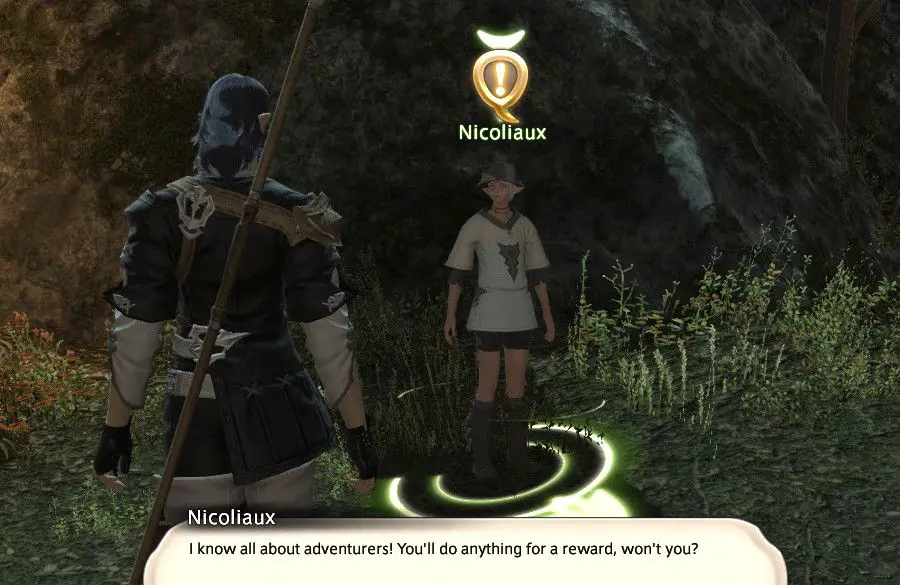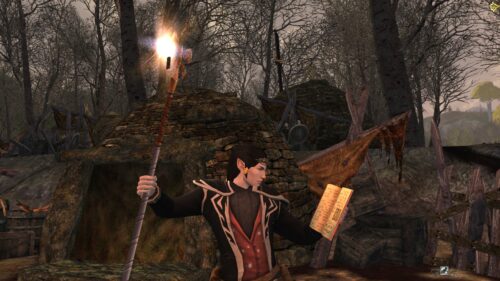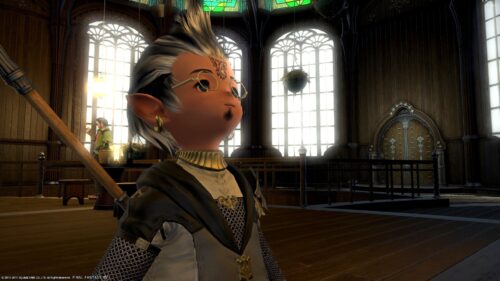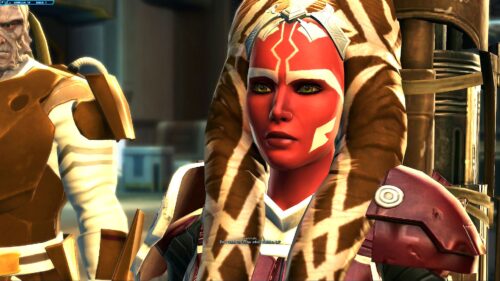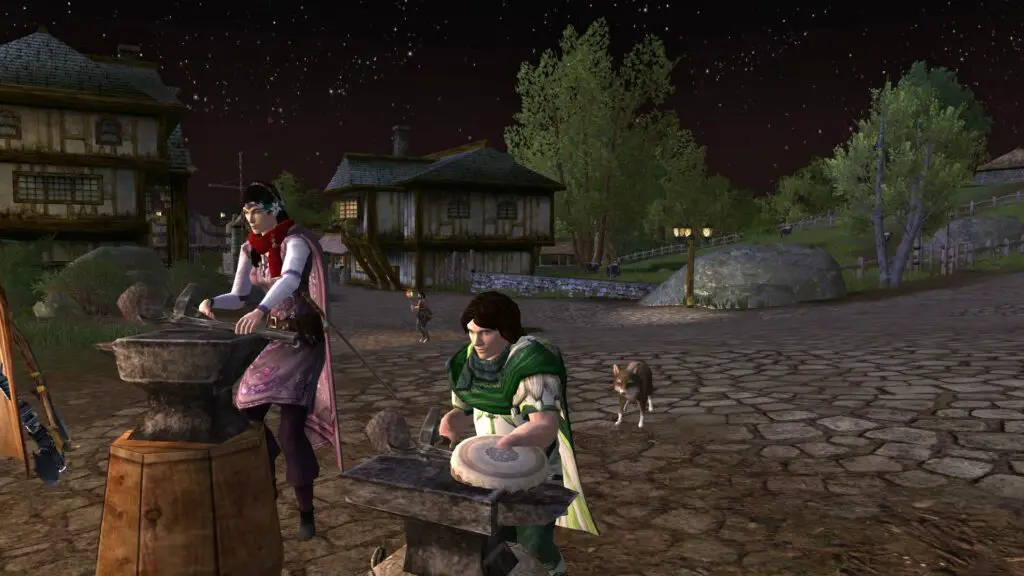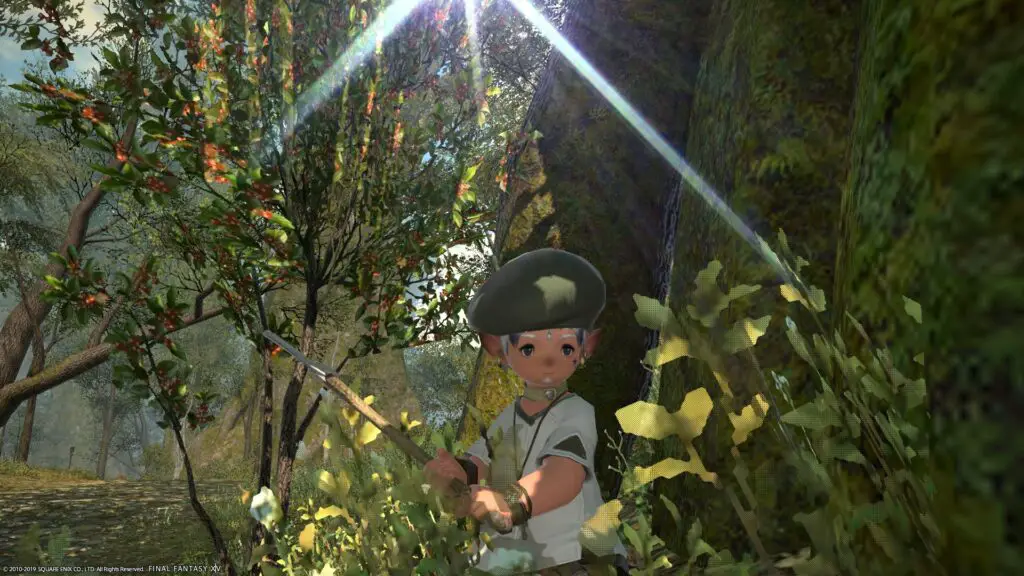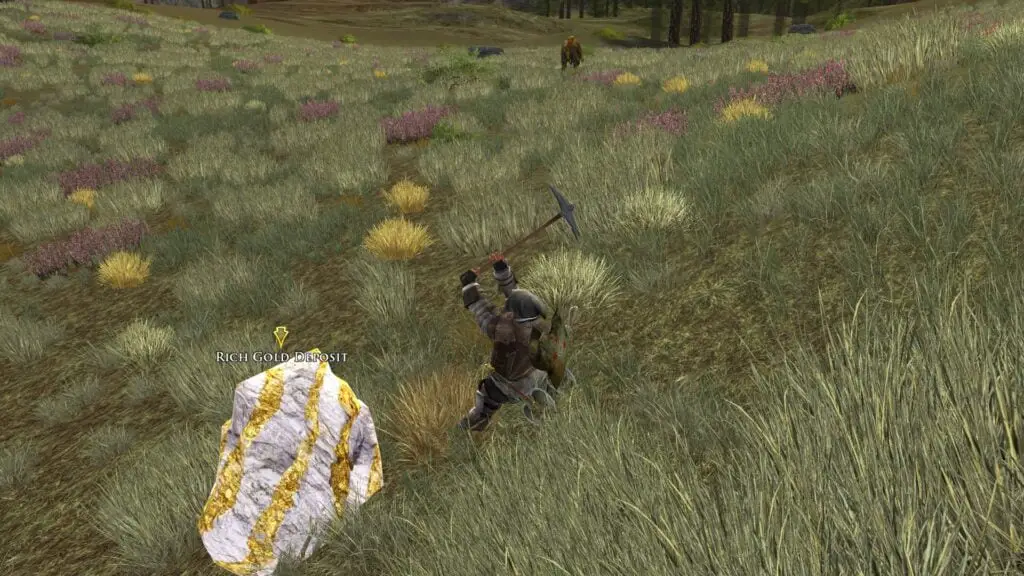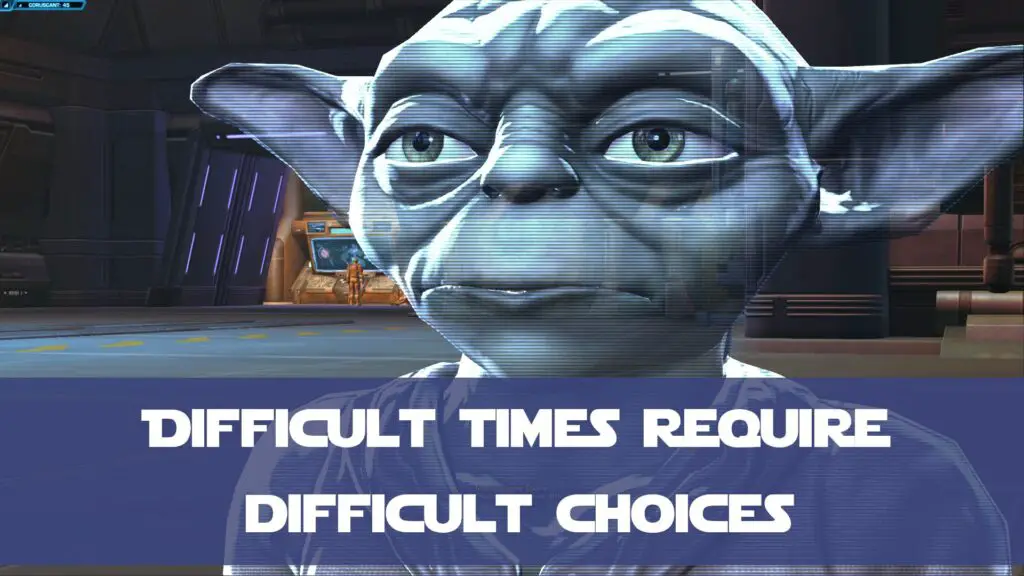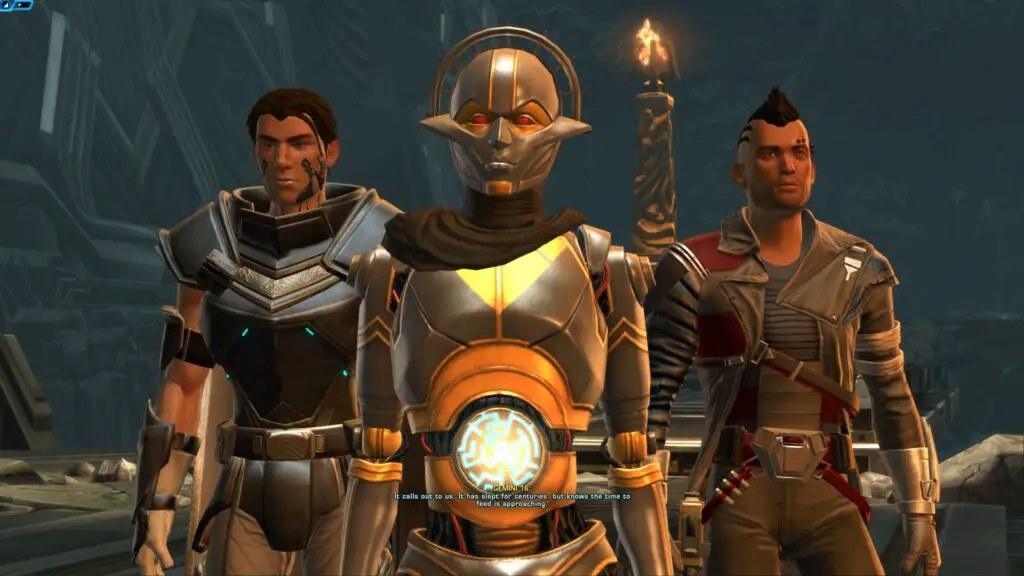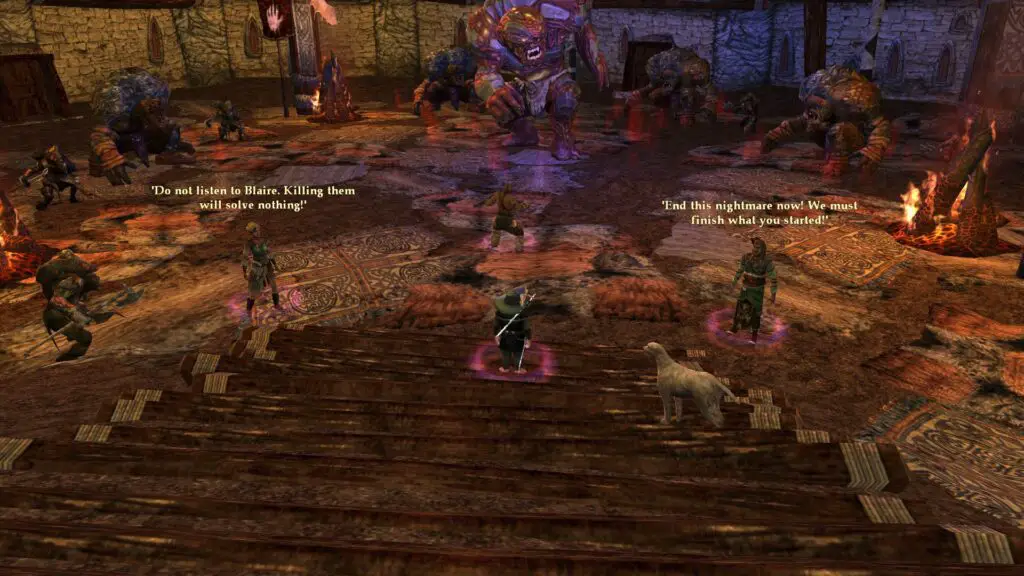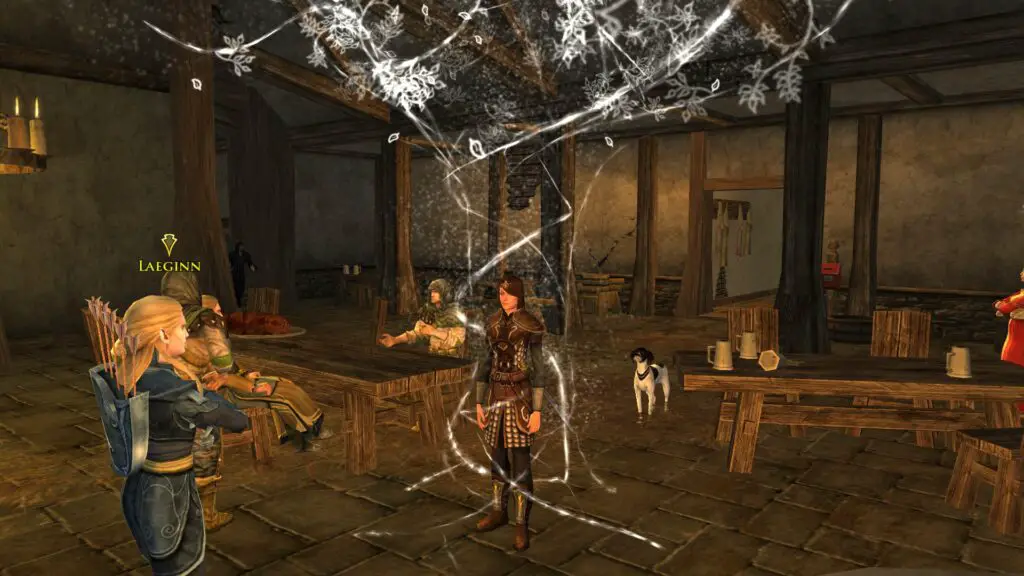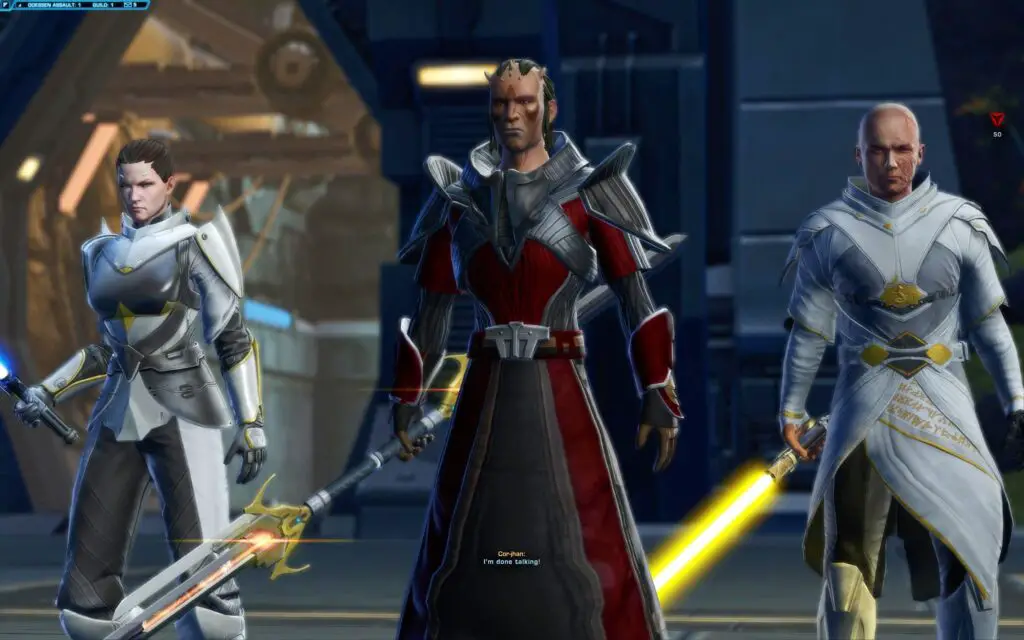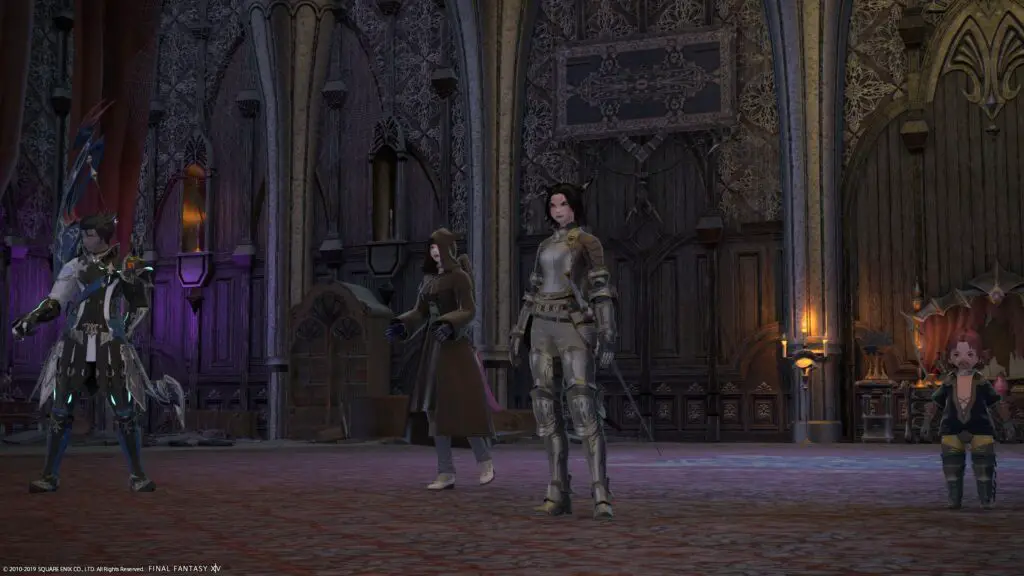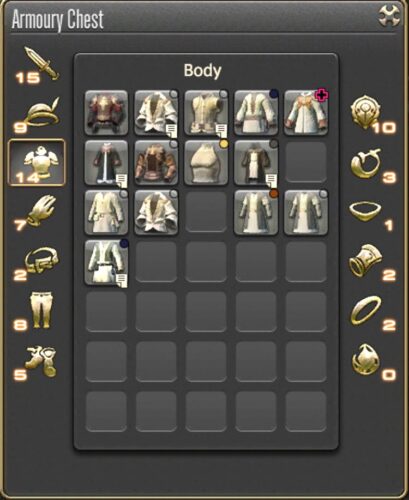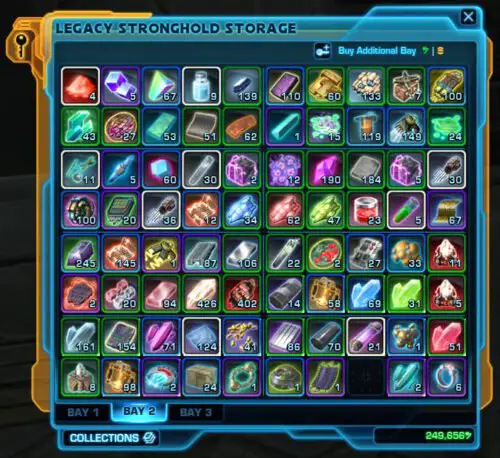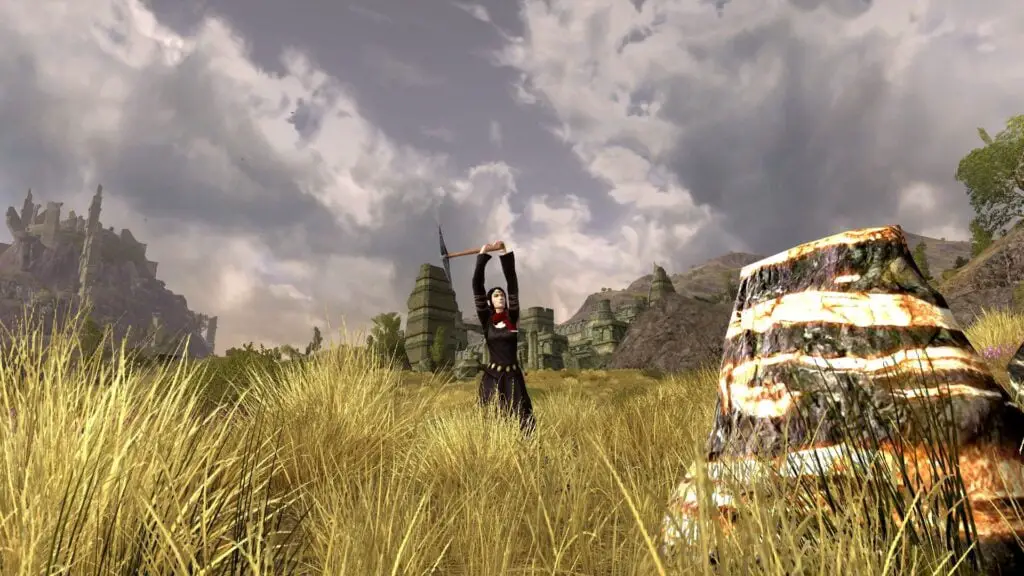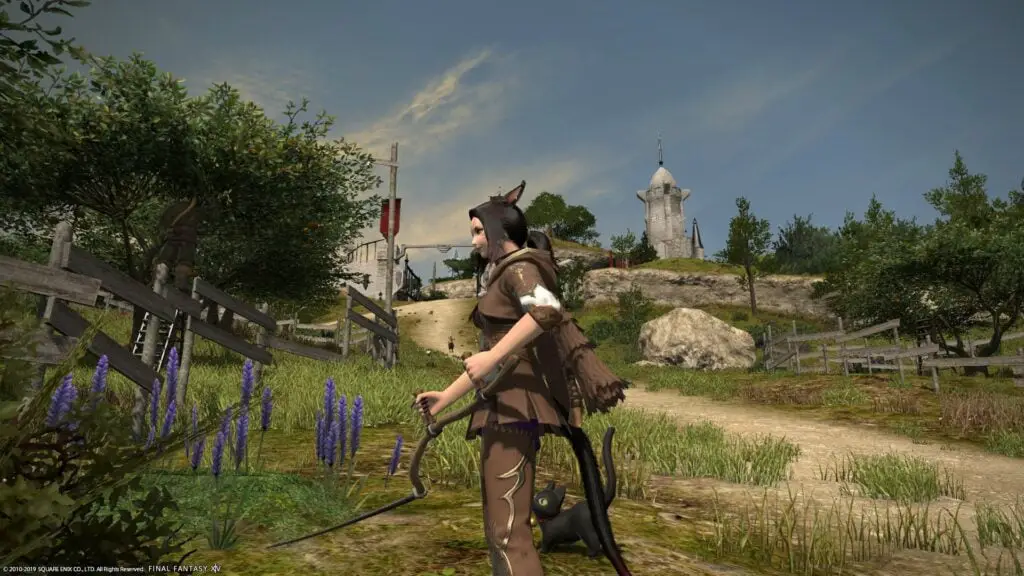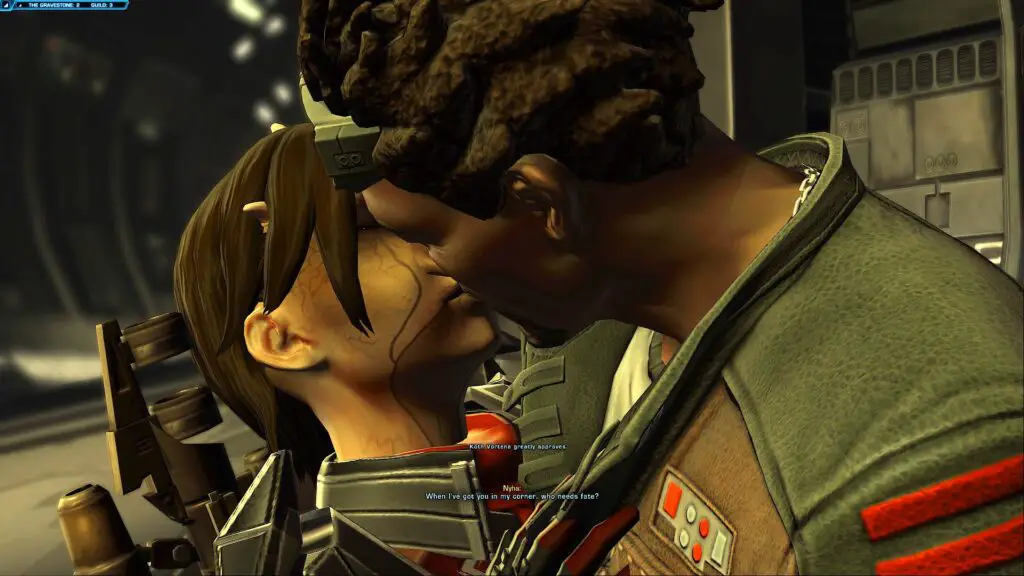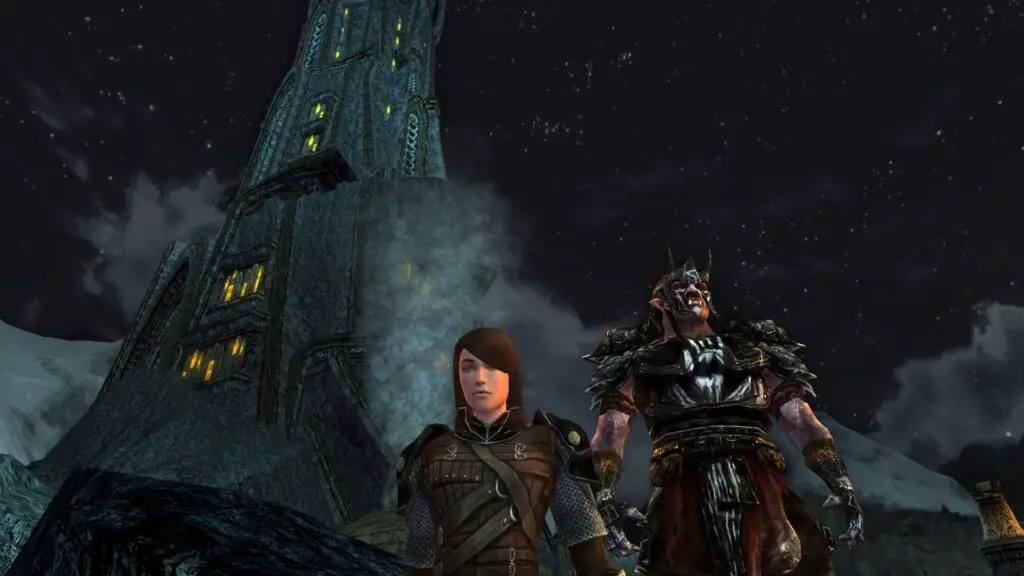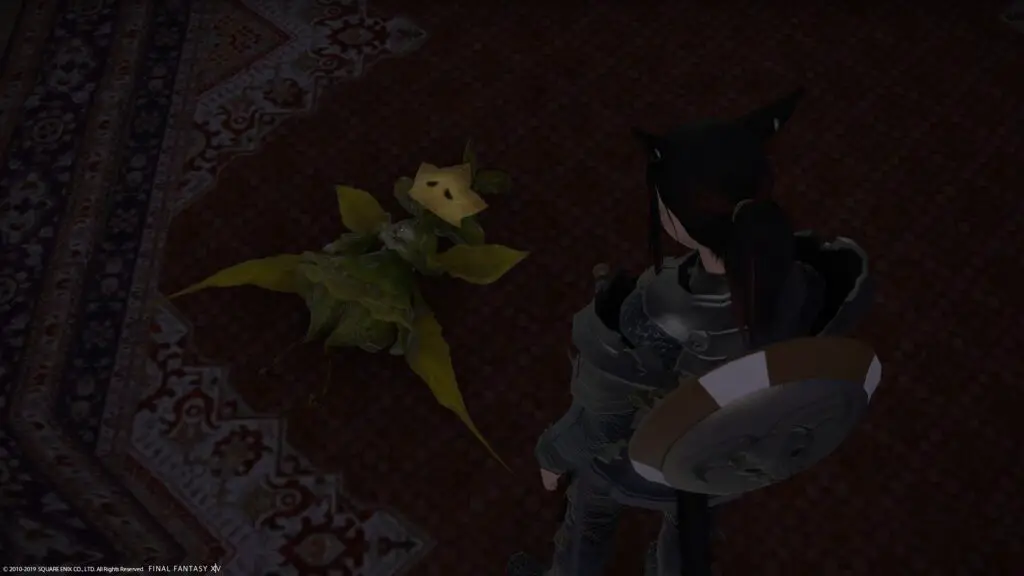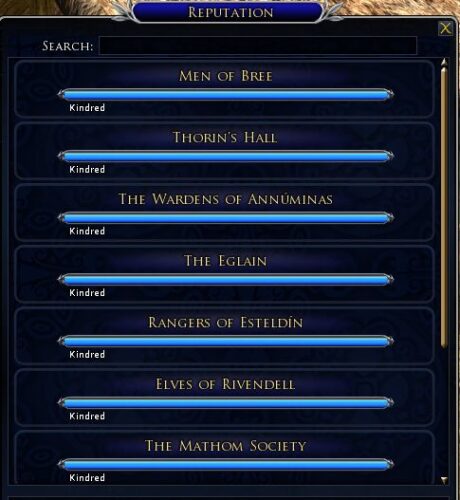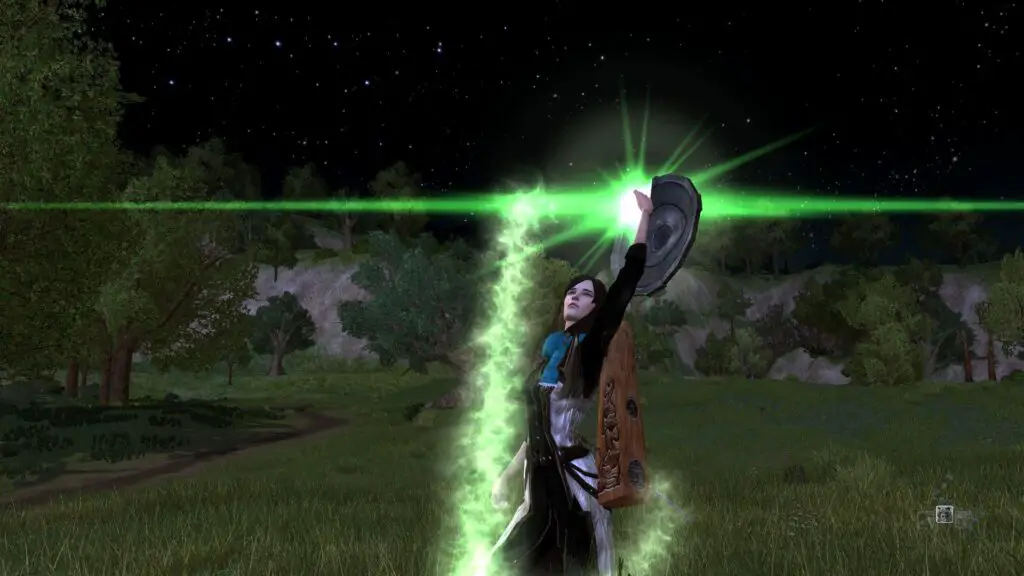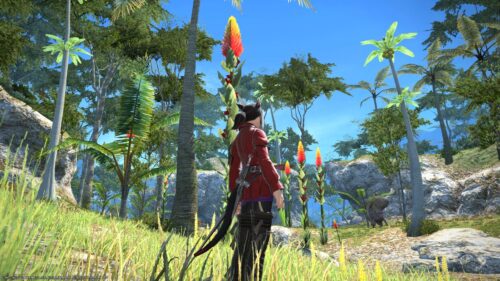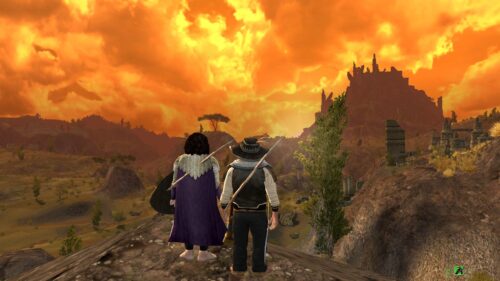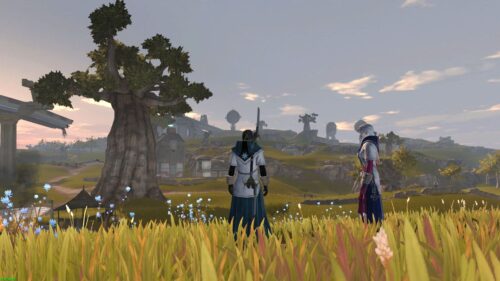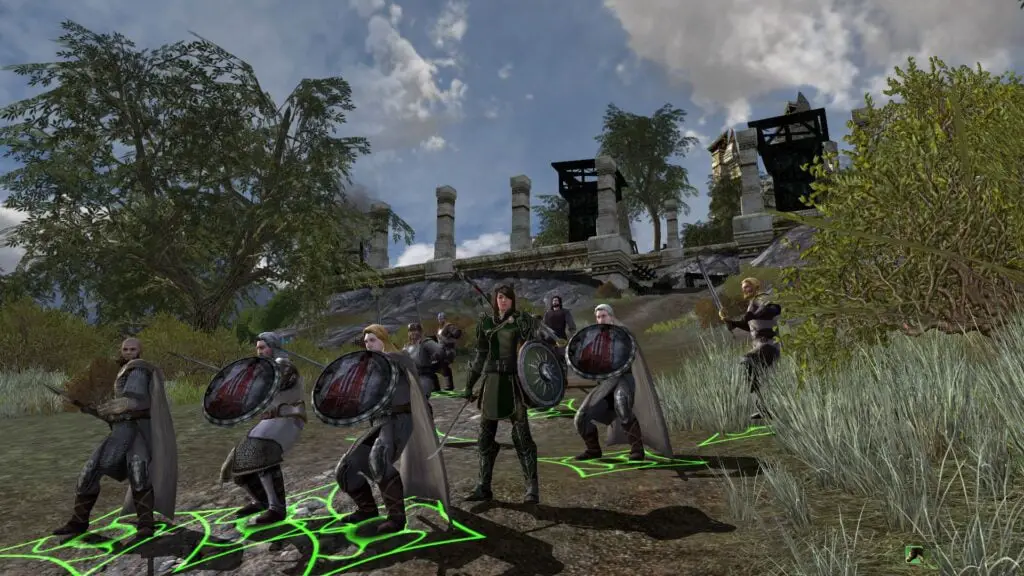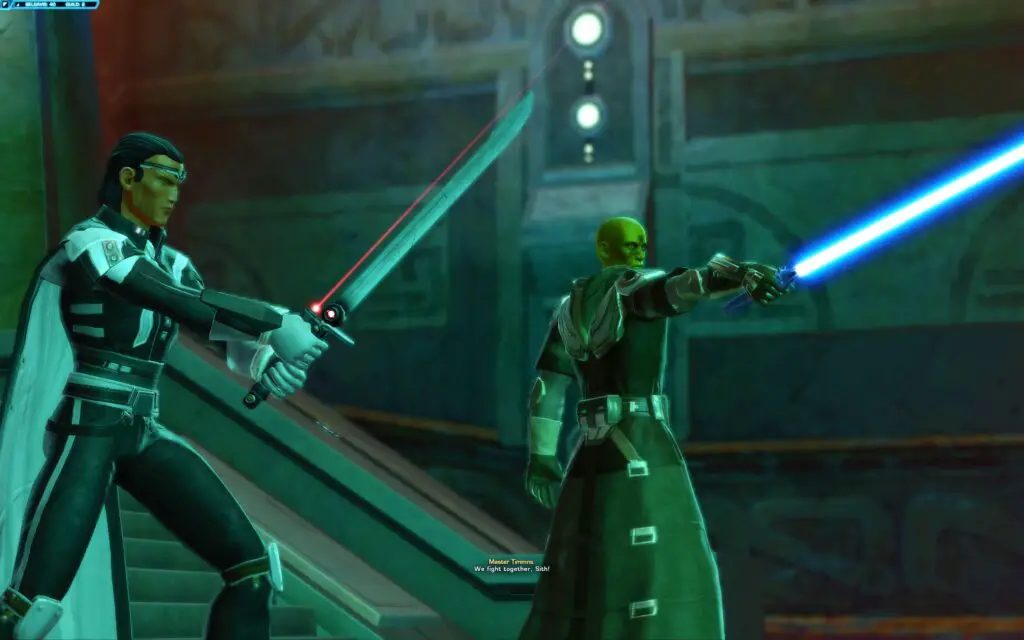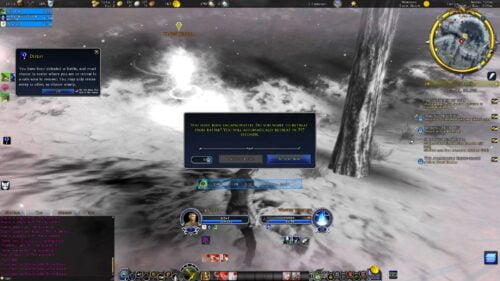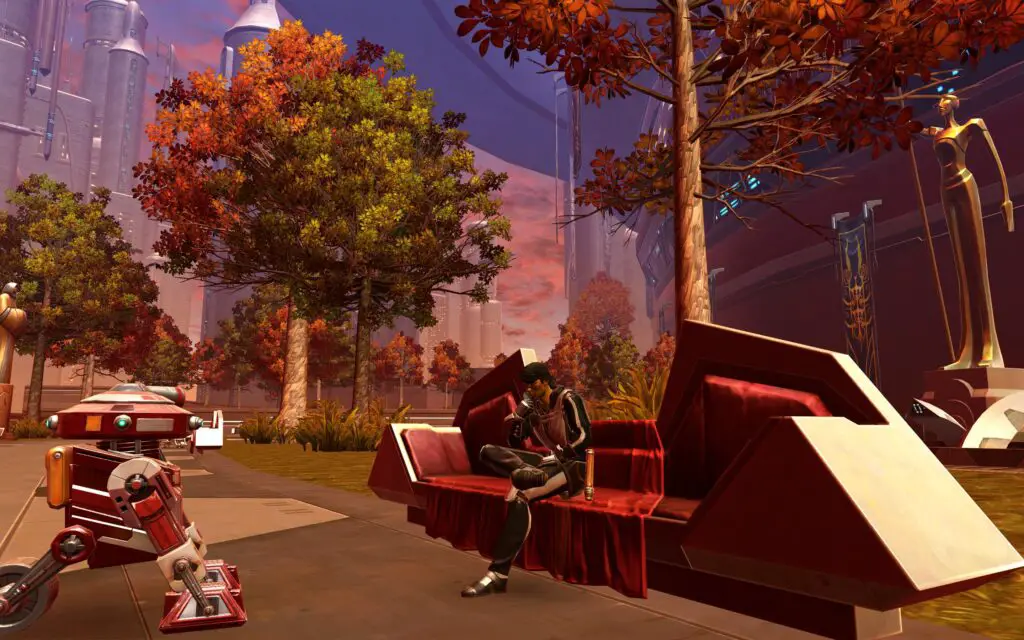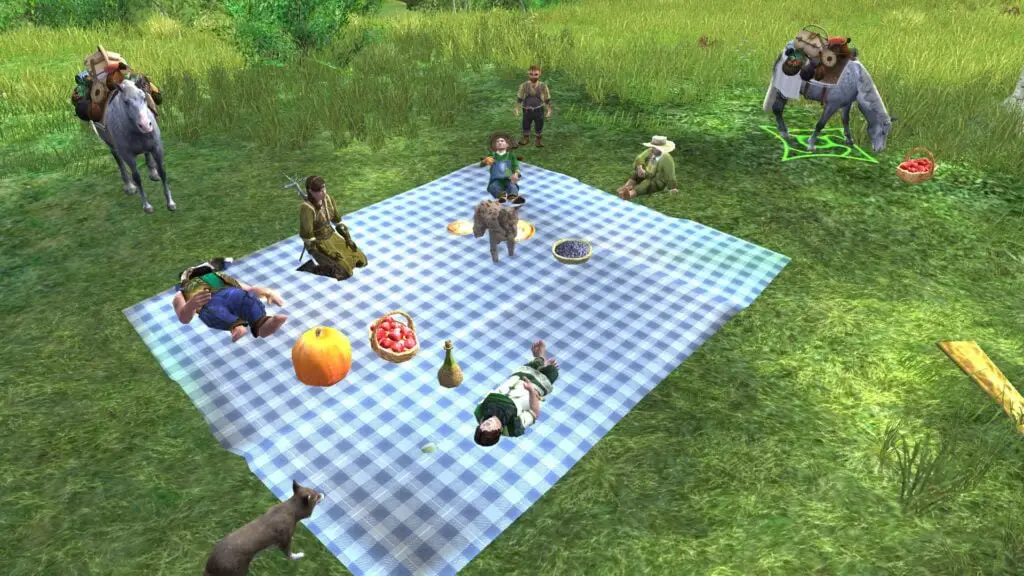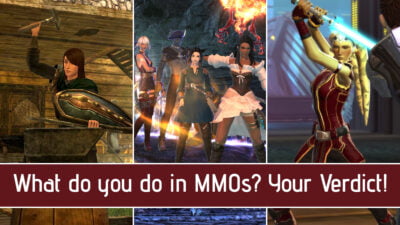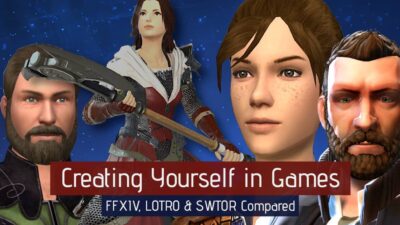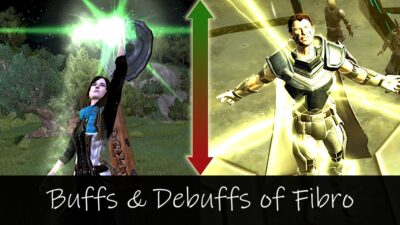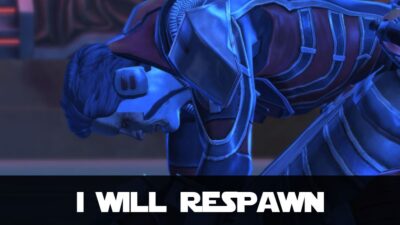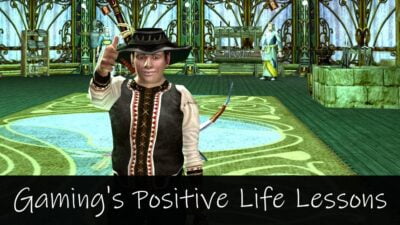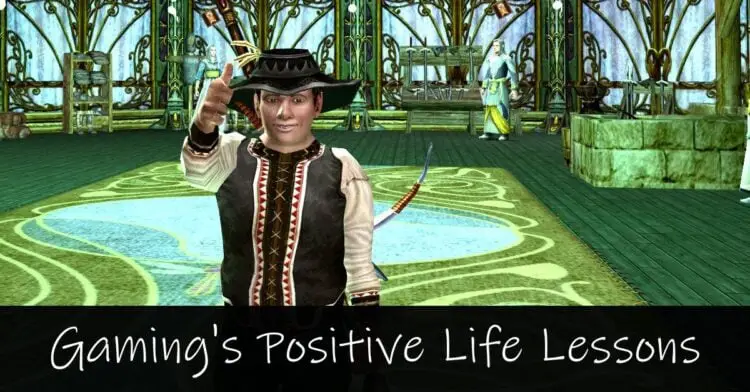
1. You Are Not Alone
When you log in your first character into an MMO (Massively-Multiplayer Online) game, you are not in isolation. There are other players running around, interacting, chatting and grouping up. The world is filled with NPCs (Non-Playable Characters) who all have their own work and concerns. The world is filled with life, whether ‘normal world’ things like butterflies and insects, or fantasy creatures such as Hobbit-sized spiders, Miqo’te-sized lizards or disgusting K’lor’slugs of Korriban. You enter a world that is already alive.
Interacting with Players
You may then decide to interact with other players more. You are be able to show emotion or greetings (to the uninitiated, these are called Emotes) to others. You are able to join a guild or Kin and develop friendships with others. And even if the only way you interact with other gamers is buying their stuff from the P2P market, that is still a reminder that you are not alone. Also SWTOR, LOTRO and FFXIV all have events, which are fun distractions from normal questing – a chance for you to relax with others.
You Need Not Be Alone
We live in a complex world here on Earth. Mental Health seemed to have never been higher in public awareness. People are much more free now to discover and express their identity in ways that would have been frowned upon even ten years ago. As our world is diverse, it is vital that no one who can be helped misses out on it. Online games offer that freedom – be who you want to be, make friends with those you want. You can create hundreds of connections, or a small group of friends. But you don’t have to go it alone, if you don’t want to.
2. There’s No Reward For Half-Hearted Efforts
Games are frequently built around a Quest (or Mission) system. A Quest is a job you pick up with specific objectives that must be fulfilled in order to complete it. The payment for the job, whether it’s in barter items (such as a new piece of armour) or coin and XP, is only received when the job is completed.
If you start a Quest and do not complete it, you don’t get paid. Simple as. On the flip side, most quests (if you ignore the odd NPC that likes to mess you around) do not have the proverbial goal posts moved. NPCs don’t decide to pay you less for the same job. So it works both ways.
This is important to reinforce: doing half a job is not worthy of praise if you promised to do the whole thing. Messing others around and altering the terms of the job without scaling up the reward is also not acceptable, though it used to happen to me a lot.
3. What You Do Is More Important than How You Look
All three of my MMOs have an outfit system. An outfit is simply a way to customise how your characters look in-game. But as a shiny new suit, or designer dress does not magically make you churn out your office reports faster, in-game outfits do not affect performance.
With the exception of Fashion Report (in FFXIV) and the occasional player-to-player competition, how you look has no bearing on your ability to complete a quest. Quest-givers judge you on what you have accomplished, not how fancy your new outfit is (usually!).
The same reward is offered to the task regardless of whether you turn up in rags, your slobbing-at-home trousers or shiny armour.
Take This Offline
I think this should be a positive life lesson: capability, reliability and thoroughness should be of higher importance than our appearance. Whatever someone’s past or present circumstances, if they get the job done, then they are worthy of reward.
4. People of All Races Can, and do, Achieve
Here are a few examples (i.e. purposefully incomplete!) of the races available in my three MMOs.
- SWTOR has Humans, Togrutas, Twi’leks, heck even Cyborgs
- LOTRO has Hobbits, Elves, Dwarves and Beornings
- FFXIV has Elezan, Miqo’te, Hyur and a race that has bunny ears
Your ability to impact each game’s world is not limited by how you were born. It does not matter how tall or short you are, what your body shape is, what your gender is, or whether you have a tattoo or scar across your face.
All players have equal opportunity to direct their characters, tick off achievements, take part in seasonal events and affect the world around them.
Don’t Judge People On Appearance
Our real-life world could learn a lot from this: do not judge someone’s worth or potential based on looks, or their past. A person’s value should not be based on their gender (or lack of), spirituality (or lack of) or their weight. (NB In LOTRO, there are clearly overweight characters – Hobbit males especially. In SWTOR, one of the male character body-types is clearly overweight).
As Yoda said: Judge me by my size do you?
5. Making Your Own Stuff is More Satisfying than Buying It
My MMOs all have internal player-to-player markets. On these, players can list items or resources to sell for the in-game currency (not ‘real life’ money). However all also offer the chance to work hard to make the very things you could purchase from others. I intend to do a comparison blog post about crafting in SWTOR, LOTRO and FFXIV, because they are all different, except at the basic mechanic of gathering items. With enough time, practice and hard work you can save a lot of coin and make things yourself.
If you have the skills in the offline world (I, generally, do not!) then you could make gifts, or repair your clothes or cook a steak dinner at home. Although I find crafting a bit mind-bending (especially in FFXIV) when I succeed in making an item, I’m very glad I didn’t go the easy route and buy it from another player!
6. If You Don’t Have the Coin, You Can’t Buy the Things
There is no option for getting into debt for your characters in these games. I’m not talking about a game’s real-money market here. If you don’t have the credits, you can’t buy things in SWTOR. If you run out of gold in LOTRO, there’s no money-lender or loan broker for your character. You have to work to earn coin, or trade to improve your situation.
Culture of Debt only Fosters a Culture of Debt
The positive life lesson here is that waiting to acquire the things you want (delayed gratification) is more sensible and sustainable than going into debt. I’m not judging anyone who is in debt, by the way, as many may be there based on necessity. It feels so much better purchasing something outright, when you have the money, rather than acquiring it now and not fully owning it for 3 years. This will never work for purchasing property, I realise – I’m more discussing optional “quality of life” items.
A culture of debt only fosters a cultre of debt. But in my gaming worlds, that isn’t an option.
7. More Difficult Jobs Should Pay Better
As you level up and take on trickier quests, the in-game currency payment improves. If you take on more complex missions, they pay better. And the hardest group content (Raids, Dungeons or Operations) have another reward tier altogether.
If you couple this life lesson with You are not alone and all races can achieve the same thing, then harder jobs are open to anyone with the ability to do them. And if you do complete them you deserve a pay relative to the job, not on who carried it out. And in a team quest, all members of the team receive recognition and reward in a game. The glory is not hogged by the team leader. If you lead a team in your work or community, then share the applause with everyone.
8. Choices Have Consequences
SWTOR in particular has a choices system. From how you speak to other NPCs, to strategic decisions, your choices often have consequences. This may be minor – such as a retort from an NPC. Or it could be destiny-shaping – such as choosing Republic or Empire in Jedi Under Siege.
NPCs’ Decisions Affect You
Then there are choices made by NPCs: an Alliance member leaving when your vision and theirs are no longer aligned. Or Theron Shan going Double Agent without informing you.
Even in the original set of SWTOR planets, decisions are made around you that affect your situation: Darth Baras manipulates the Sith Warrior, the Star Cabal attempts to instigate galactic annihilation and most of Havoc Squad defects to the Empire. You are not immune to consquences – even of things you cannot foresee, control or influence.
Even in LOTRO you can affect story by choices: which direction should the Grey Company pass into Dunland? Should these transformed Dunlendings be exterminated or left in peace?
The Real-World Life Lesson
The life lesson is that your actions today affect your tomorrow. And oftentimes, your decisions could affect someone else’s tomorrow too. It’s important to recognise that, I think.
9. You Are Responsible for Your Life
In a game, if you don’t complete a quest, you get no reward (as discussed earlier). If you choose not to learn how to craft metal weapons, then you will need to acquire these another way. If you miss an in-game event, you can’t expect the rewards from that. If a game has a promotion for its paying subscribers, and you’re not one of them, then you (nor I) cannot expect those perks.
You are responsible for your life, your choices and your attitude. While we can influence people around us, they are responsible for their lives too. In a game, your character is pretty much what you make them. They create or destroy connections, they spend ‘money’, they talk to people. You cannot blame another person (player or NPC) for a bad decision, conversation or other action that you yourself carried out.
Take Ownership of Your Life
We are responsible for our lives. Yes, life on Earth comes with restrictions – e.g. from cultural norms or the law. But blaming others for our own choices does not lead to growth, or respect for that matter. Take ownership of your life.
10. Promotions Come Through Hard Work
Many games are based on a “Levelling Up” mechanism. If you’re a non-gamer reading this, here’s what that means: if I defeat an enemy, or complete a list of tasks (aka a ‘Quest’ or ‘Mission’) then you receive XP (eXPerience or eXperience Points). Once you have accumulated a certain number of XP you ‘level up’. Levelling up may give you new abilities/skills and can open up quests that require a higher level. This is like job promotion in the real world.
Level-Up / Promotion is Earned
If you ignore the fact that you can level up in LOTRO events, many of which require no combat, most of levelling in a game is through ‘work’. That may be completing a quest, defeating a number of a certain type of enemy, or making items (crafting). Promotion is not gifted: it is earned.
If you want more responsibility in life, or a higher position or promotion, that is likely to only come after a certain amount of hard work. Not all tasks will even involve thanks or praise. That does not mean they are of no value.
11. You May Be Responsible for Others’ Lives
While you can do a lot of content on your own in MMOs, your character is not always alone. Some quests may involve providing safe passage for an NPC. Other ones may see you fight alongside individual or army. And oftentimes, a quest would fail if you do not ensure characters survive the quest. Regardless of whether you’re a Damage Dealer, or Tank or Healer, you’re responsible for the success or failure of those around you.
When Playing With Other People
Even more so than fighting with NPCs, if you undertake group content with other players then you must play your part. While a group succeeds or fails as a group, it cannot be denied that sometimes the outcome can be swung by individuals doing their jobs well, or badly. If Tanks do not hold aggro, or damage dealers are lazy, or Healers don’t react fast enough to heal themselves or others, the whole group could fail.
Play Your Part in Life
The real-world application is this: whether in family life, in an employment context and even in society as a whole, we all should play our part as well as we can. When we treat others properly, don’t take advantage of them and care for our corner of the environment – we affect other people’s lives.
12. Hoarding Causes Stress
We have lots of options for storing ‘stuff’ in games: Bags, inventory, armoury vaults, wardrobes, Chocobo saddlebags or a storage box at home. Yet often I’ve experienced, and have seen others go through – stress or annoyance with managing that much storage. Weirdly in offline life, I don’t hoard things, neither does my wife. But then, I’m generally ‘better off’ in games than I am in offline life too!
With crafting materials, outfits, tools and food – it is easy to lose track of what is stored where and by which character. Admittedly there are LOTRO Plugins to help with this, and FFXIV has a massively useful /isearch command. Nevertheless, owning so much stuff causes annoyance sometimes! Worrying about keeping something ‘just in case’ can distract from relaxing in-game, or enjoying the stories in them.
In-Game and Real-World Solution
Keeping things ‘just in case’ in the past, for me, has been for something that never happened. The real-world (and in fact, in-game) is to look for others who are in need. You may see a player who needs help with making armour, or requires crafting materials, or other help. In the offline world, look for others who are in need: help foodbanks if you can or consider donating unneeded items to charity, or to a neighbour you know is struggling.
13. You Break It, You Fix It
A really quick one this time! In game, items that are used become worn and eventually unusable if they completely wear out. But the responsibility for repairing your tools and clothing is the player’s. In most cases you pay (non-real world) money to a vendor/shop-keep to do the repairing. In FFXIV there is a mechanism to repair your gear in the field, but I don’t think SWTOR/LOTRO have a similar mechanism (You still pay credits to your in-the-field droid if you have one).
Choose Repair Over Replace
Except where you need specialist gear for a job, where possible repair your stuff rather than replacing it. If you break something, you fix it – or arrange for it to be fixed. It comes back to taking ownership of your life, of my life.
14. To Use Nature’s Resources, Nature Needs to Replenish It First
Crafting – the creation of gear and other items in games – begins with collecting resources in the world. Whether that’s crystals from Ilum in SWTOR, metal ores from Bree-land in LOTRO, or chopping wood in the Black Shroud in FFXIV – all these come from nature first.
But once you have gathered all you can from one location (aka a ‘Node’) you have to wait for it to regenerate (respawn) before you can take more.
Give Nature a Chance
The life lesson here is that nature needs time to recover before you extract more resources from it. Our real world does ‘crafting’: creating vehicle fuel from oil, meat from animals, fruit from trees and grain from the fields. Crop rotations help fields to recover and trees are planted to replace those felled. Nature is full of resources, but we have to be careful not to over-exploit it.
15. How You Talk to Others Impacts How They View You
Where SWTOR is different to my other MMOs in how it implements companions. As you progress through content you can gain (and later, even lose) companions. These NPCs then go with you into combat. LOTRO has classes with companions (e.g. Lore-Master animals, or Captain Heralds) but where SWTOR is different is the development of friendships and relationships.
Depending on your conversations with them, or with others while they are with you, you can improve your approval rating with them (called ‘influence’). And some friendships can develop into full romances.
But beyond that, the actions you take in the story affect future interactions with them. You can make enemies of former allies, decide which side to take in a war and even whether to kill or let various NPCs live. But even at the simple, conversational level, how you reply to an NPC impacts the next step of the conversation.
How to Make Enemies and Lose Influence
How you speak to others and what tone you use changes the course of your, and their life. I’m not talking about games now. Friendships and relationships are either built up or torn down by how you speak to people. While you cannot control someone’s reactions to you, we have this option: as far as it is possible, stay at peace with others.
16. Asking for Help is Nothing to be Ashamed Of
Something we have to tell our small daughter is that it is okay to ask for help. In games, I am still taken aback at how generous gamers are with their resources and time. I’ve had players give me mounts and armour out of the blue. Randomly gifted LOTRO points and in one case, a whole expansion, have surprised me. And in FFXIV, I have been helped through tricky content by my Free Company (Guild) and given crafting resources.
Self-Determination Different from Pride
In life, where we are capable, it is great to take ownership for our lives. But that is different to pride that believes we should be able to do everything in our lives alone. Some people may be gifted that way – I am not.
If you’re struggling with something in life, find someone to talk to. If you need advice on managing your finances, then make sure you get that advice. If a task is too great for you, ask for help and share the work.
17. No One is Invulnerable
In games, as in life, your character is not immune to harm. You get wounded from weapons, poisoned, blinded by a flash of light and injured when you fall. You are allocated a number of Health (or Hit) points. When those are all used up, you are defeated and must retreat to heal.
Non-Combat Elements
As well as taking injuries in combat, your character, while being central to your story, is not all powerful. Here’s one example from each of my MMOs.
- SWTOR: at the start of the Knights of the Fallen Empire your character is struck down and frozen in carbonite. The story then follows a desperate attempt to escape your new enemy’s capital planet as a hunted person.
- LOTRO: In an unexpected (if you’ve never played before anyway!) turn of events, you become enslaved by Saruman at Isengard. You have an Uruk overseer and are forced to do menial (and sometimes downright disgusting) tasks, until a plan to escape is hatched.
- FFXIV: during A Realm Reborn, your character moves from victory to victory. Your work for the elite group called the Scions of the Seventh Dawn, which seeks to take down some of the greatest powers in Eorzea. But just when you return from a huge victory, the Scions’ secret hideout is attacked. Many are killed and its leader Minfilia is captured.
Strong Yet Fragile
Us human beings in the real world are a strange tension: we are remarkably resiliant and yet at the same time are hugely fragile. We can plan our lives, have a career strategy, a lifestyle approach but we cannot control it 100% of the time. Events outside of our control will directly impact our lives. I’m not saying we should fall into despair over our powerlessness. But we need to hold a balance between having a direction with the awareness that change may come when we least expect it.
18. Trust Is Not Instant
All three of my MMOs have, for want of a better word, a ‘trust system’:
- SWTOR: Eternal Alliance contacts and allies have opportunities for earning trust. You have to forge working relationships with people who were once your enemies.
- LOTRO: Most regions you quest in have a ‘faction’ with its own ‘reputation’ level. You start as an unknown (and sometimes even an ‘outsider’). You improve your reputation with a faction by completing quests, carrying out great deeds in the area and finding special items. As you become more trusted, rewards are opened up to you. But you have to work to earn the local people’s trust first.
- FFXIV: A simple example in FFXIV are the crafting guilds. You start as an eager student, with the NPC guild leader (usually) expecting you to fail as countless others have. But as you improve your crafting level, the leader begins to trust you with more important jobs. But again, you have to work to improve your level before those conversations can happen. I’ve also recently unlocked one of the Beast Tribe crafting factions, which work on a similar idea to the LOTRO reputation mentioned above.
Trust is Earned
The same is true in life. We cannot presume others will instantly trust us, however ‘good’ you think you are. And nor should they. While we should not slip into being suspicious of new people, caution is a good start. My Mum used to say “It takes a hundred years to build up trust, and a moment to lose it”. We should not abuse people’s faith in us, nor tolerate others taking ours for granted.
19. Skills Get Better With Practice
Whether it’s combat, or crafting or simply knowing the best travel routes, gaming is the epitome of ‘practice makes perfect’. Perfect is too superlative, I realise! Even taking good screenshots takes time. In all games, the more you play them the better you’ll perform. I learned how to tank in a small group in FFXIV. By rearranging my skills bars in LOTRO and SWTOR I became better at Solo content. This instills a good ‘work’ ethic: you cannot expect to become a Jedi Master without getting your basics right.
So it is in the real world: if you want to do something (e.g. play a musical instrument, learn a language, or make your own furniture) then you have to keep working at it. Persistence pays off, so long as you’re also at peace with asking for help when you need it too!
20. The World Should be Enjoyed, Not Just Exploited
Games offer a unique environment, landscapes, plants and animals. Each will have its share of dangers too. And as you progress through games, the crafting materials you can obtain will become more useful and valuable. But, for me, gaming is not about achievement (usually). If I don’t enjoy playing a game, I will take a break from it and come back to it another day. If an aspect of a game feels like work (e.g. grinding for gear) then I usually don’t take part in that bit.
But on top of that, I use #StopAndStare hashtag on Twitter occasionally: showing my characters enjoying their envioronments.
Enjoy Planet Earth, Don’t Abuse It
Our planet is full of natural wonders, from delicate flowers to roaring waterfalls. Yes, it is rich in resources too: fossil fuels, gases, wood, milk, gemstones and metals. But we also have to live in relative harmony with our planet – we rely on it more than it relies on us. If we were removed from Earth, she would recover and reclaim areas we inhabited. So let’s try to look after our planet – if not for ourselves, then for the generation that follows us.
21. Opposing Injustice is Everyone’s Responsibility
Although your character is usually at, or near, the ‘centre’ of a story, they are far from alone. In LOTRO, your character will have to work with Elves, Dwarves, (Wo)Men, Hobbits and Beornings. Occasionally you have to work with an enemy to survive. In Rohan, you cannot hope to face down Saruman’s armies on your own. Instead you have to encourage towns of Rohirrim to play their part.
In FFXIV, you need to group up to face some of Eorzea’s greatest evils. And in SWTOR, you may have to work with people you adamently disagree with. The Sith Warrior can push Republic forces to fight for them on Nar Shaddaa. On Hoth, as a Republic character, you find a joint mission with the Empire to face down the Hailstorm Brotherhood. Tackling the world’s/galaxy’s biggest challenges cannot be done alone.
We Must All Do Our Part
Our world is full of difficulties, challenges and injustices. We cannot hope to take on even a tiny fraction of them – and definitely not on our own. What we can do is take up the gauntlet to face down injustice wherever we encounter it. Stand up for the bullied kid in school, make sure minority voices are heard, that governments and businesses do not stand unchallenged. It may start with healing family relationships. One life improved through our actions is a life well spent. And if your circumstances allow you take on wider-reaching issues, make sure you have the right people in your team. Then go change the world.
22. Talking Before Weapons Are Drawn is (often) an Option
In SWTOR, especially, there are conversations that do not need to result in combat. Not all of them – sometimes the other character will not be dissuaded from getting their blaster out. But some conversations let you work out a non-violent resolution too.
This is a positive life lesson from gaming: before threatening weapons, court action or cutting communications we should, well, communicate. Aggression only leads to aggression. As with games, some situations and people may just be bent against non-aggressive approaches. But where it is possible, however improbable, talk through those situations. And if the only thing you gain out of the conversation is an avoidance of anger – then that is still a win.
23. Defeat is Nothing to be Ashamed Of
Full Disclosure: When I first started playing Star Wars: the Old Republic, I died on Tython. To non-SWTOR gamers, this is the first introductary planet for Jedi Consulars and Knights. I’d be so embarrassed if I did that now! Sort of how embarrassed I was to have been KO’d during last year’s Yule Festival in LOTRO!
But being defeated it always a possibility. The question is what do I do when defeated? I could decide never to try that thing again (which I do with certain types of content!). Should I come back when I’m a higher level, or have better equipment? Do I need to ask for help?
Heck, only last week I died after I fell off a cliff in LOTRO. But your character is not ‘killed’ in a game: they just respawn. You always have a chance to be the victor.
I Get Knocked Down…
…and sometimes I get up again. Life not panning out how you had planned, I suspect, is normal. Each person is a result of victories and defeats, happy and sad events, friends and adversaries. As someone who suffers (and often it does feel like suffering) from depression, it can be too easy for me to stay proverbically ‘knocked down’. Life has thrown so many curveballs my way:
- Losing two jobs due to underperforming when Fibromyalgia symptoms made thinking just too hard
- A church we moved 500 miles to help start was suddenly no more
- Having to move out of a rental house as the owner decided to sell it
- My mother having rapid-onset Alzheimer’s Disease
- Having to give up a small business due to factors outside my control
- Oh yeah and developing those painful Fibromyalgia Symptoms. Small thing, you know?
We All Have to Respawn
You will have your own challenges, some of which I wouldn’t even dare face. My difficulties don’t make yours any easier! What we can influence, is our reaction to those events. It has often taken other people to tell me to keep going. It is not easy, but after an apparent defeat is a choice: to try again, to do something different, ask for support, to take timeout so you can properly consider the next step. In a sense, we have to ‘respawn‘ multiple times in our life.
24. Resting is Not Laziness
In many games combat (e.g. fighting enemies and occasionally those you thought were allies) is the main chunk of your character’s life. But it is not the only thing: you can travel around the regions (or planets), you can talk to friends (either the friends of your character, or actual friends who also play), enjoy an in-game event, go shopping and spend time at home.
There are multiple ways all my three MMOs allow a character to have timeout from fighting (which is essentially their ‘day job’ lets be honest). Your characters can rest before returning to duty.
Honour Yourself With Rest
As someone who has to rest a lot, resting can feel like laziness. In the culture of the UK, people are assessed more on what they do – and in some situations (like not losing a job) that’s necessary. The problem is that we can feel our innate value is intrinsically linked to our productivity levels. People on Twitter have to remind me that it’s okay to rest. Life can be insanely busy – but if we do not rest we do ourselves, our families and our careers a disservice. Despite the Internet providing an ‘always on’ mentality, we do no one any favours by not stopping. So honour yourself with rest, real rest, whatever that looks like for you.
TL;DR Gaming Does Offer Positive Life Lessons!
With so much bad news around gaming, it is vital that we see the positives in games. Many of the attitudes we need to be successful in life are found in the normal life of our characters. The next challenge is to allow those life lessons to flow in both directions. Let your character enjoy relaxing between frantic battles. And allow these positive life lessons from gaming to help us improve our non-gaming life too!
